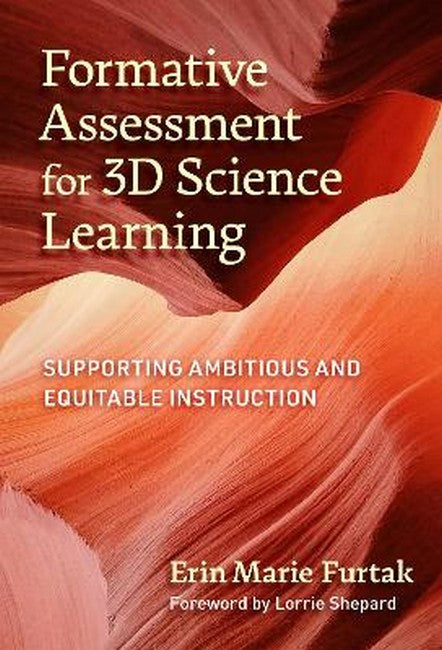Erin Marie Furtak is professor of STEM education at the School of Education, University of Colorado Boulder. Dr. Furtak received the 2011 Presidential Early Career Award for Scientists and Engineers (PECASE) and the German Chancellor Fellowship from the Alexander von Humboldt Foundation (2006).
Request Academic Copy
Please copy the ISBN for submitting review copy form
Description
Contents Foreword Lorrie A. Shepard ?xiii Preface ?xv My History in Science and Formative Assessment ?xvi Why I Wrote This Book ?xvii Scope ?xviii To Whom This Book Is Directed ?xviii Acknowledgments ?xxi PART I: FRAMING 1. ?It's Time to Rethink Formative Assessment in Science Education ?3 What Is Formative Assessment in Science? ?4 New Understandings About Learning That Influence Curriculum, Instruction, and Assessment ?5 Formative Assessment for Ambitious and Equitable 3D Science Learning ?11 Initial Drawings ?15 Family Activity ?15 How to Read This Book ?16 2. ?Broadening Our View of Science Formative Assessment ?19 Formative Assessment in a System of Classroom Activity ?21 Defining Elements of a Formative Assessment Activity System ?23 How Activity Systems Work to Support Learning Through Formative Assessment ?33 Looking Ahead ?38 3. ?Formative Assessment as a Vehicle for Equity and Justice in Science Learning ?39 Structural Influences on Science Formative Assessment ?40 Constraints on Formative Assessment ?43 Formative Assessment as a Vehicle for Equity and Justice ?45 Self-Reflection for Ambitious and Equitable Teaching ?47 Centering Equity and Justice in Formative Assessment: Examples ?49 Equity and Justice: Connective Threads for Formative Assessment Design and Enactment ?53 PART II: TASKS AND PRACTICES 4. ?Questions Worth Answering: The Role of Phenomena in Formative Assessment ?57 Considerations for Phenomena ?58 Types of Phenomena for Formative Assessment ?63 How Different Phenomena Support Formative Assessment Across an Instructional Unit ?66 Resources for Identifying Phenomena for Formative Assessment ?69 Putting It All Together: Framing Formative Assessment Tasks With Phenomena ?69 5. ?Formative Assessment Tasks: Artifacts and Material Representations of Student Thinking ?71 What Do We Mean by "Tasks"? ?72 The Role of Formative Assessment Tasks ?73 Integrating the Three Dimensions in Formative Assessment Tasks ?75 Elements of Multicomponent Formative Assessment Task Design: Supporting Learners to Show What They Know ?81 Putting It All Together: Redesigning a Multicomponent Formative Assessment Task ?92 Beyond Paper and Pencil: Technology-Assisted Formative Assessment Tasks ?100 Looking Ahead: The Importance of Practices and Feedback ?103 6. ?Norms, Routines, and Community: Classroom Enactment of Formative Assessment ?105 What Do We Mean by "Enactment"? ?105 Participation Structures ?106 Norms and Routines ?111 Talk Moves: Essential Elements of Formative Assessment Classroom Practices ?118 Putting It All Together: A Formative Assessment Conversation to Support the Development of Student Thinking ?119 7. ?Feedback ?125 Feedback to Support Science Learning ?126 A Model of Feedback ?127 Medium Cycles ?138 PART III: BEYOND THE CLASSROOM 8. ?Tools and Routines for Professional Learning: Collaborative Formative Assessment Design ?143 Teacher Professional Learning Through Formative Assessment Design ?144 Steps for Collaborative Formative Assessment Design ?145 Increasing Opportunities for Teachers to Learn Through Collaboration and Formative Assessment Co-Design ?159 9. ?Learning Progressions: Tools for Formative Assessment ?161 Defining Learning Progressions ?161 Learning Progressions for Three-Dimensional Assessment ?163 Three Functions for Learning Progressions in Formative Assessment ?164 Features of Learning Progressions That Support Formative Assessment ?174 Potential to Guide Formative Assessment, With Caution ?176 10. ?Conclusion: Formative Assessment for Ambitious and Equitable Science Learning: Toward a New Horizon ?177 Main Arguments ?177 What Can We Do? ?178 Closing ?179 Appendix A. Phenomenon Planner ?181 Appendix B. Heated Cup Task ?183 Appendix C. Formative Assessment Task Design Checklist ?185 Appendix D. Weather in Three Places Task ?187 Appendix E. Snowmelt Task ?189 Appendix F. High-Elevation Task ?191 Appendix G. Enactment Planning Guide ?197 Appendix H. Skateboarder Modeling Task ?199 Appendix I. Sample Meeting Agendas for Collaborative Formative Assessment Design ?201 Appendix J. Learning Progression Unit Planner ?203 References ?205 Index ?221 About the Author ?227

